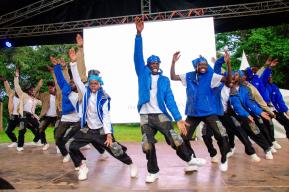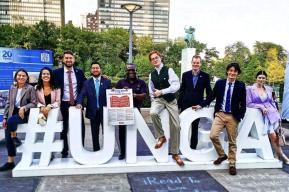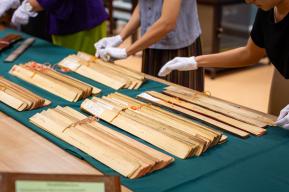The Skills and Technical Education Programme (STEP) has partnered with Development and Integration of People with Disabilities (DIPD) to train 21 people with mild to severe disabilities in technical and vocational skills in the Mchaisi village and surrounding area within Mchinji district.
STEP, a European Union funded programme partly implemented by UNESCO in partnership with the Ministry of Labour, Skills and Innovation (MoLSI), is providing bursaries to trainees who have disabilities. DIPD has partnered with the Technical, Entrepreneurial and Vocational Education and Training Authority (TEVETA) and Malawi Council for the Handicapped (MACOHA) to implement the training. The project aims to improve the economic capacities of persons with disabilities through newly acquired vocational skills, self-esteem, confidence and functional autonomy.
The 21 trainees (12 females and 9 males) have different disabilities including hearing impairment, visual challenges, epilepsy, speech challenges, and mild to severe physical disabilities, amongst others.
The project originally intended to target youth beneficiaries but was expanded as DIPD found a high demand for skills training amongst some older people living with disabilities. The trainees range in age from 16 to 61 and are training in bakery, tailoring, hairdressing, welding and fabrication, cell phone charging, and motorbike mechanic skills. The first training commenced in December 2019, with the others starting in January and February 2020.
The project adopts a successful case replication (SCR) approach; an informal apprenticeship and peer training model. The trainees learn directly from a successful tradesperson in their local community. There is no classroom teaching; instead, the training takes place at the tradesperson’s place of business or when necessary at the trainee’s home. The project aims to match the trainees with a tradesperson, they know and trust to provide the training. During the trainer selection process the trainees recommend a suitable tradesperson, DIPD and MACOHA then visited the tradespersons’ places of vocation to confirm if they met the criteria. After the initial identification, the potential trainers were assessed by TEVETA. The training uses the TEVETA approved competency-based education and training (CBET) method, which combines the theory with the practical and focuses on what the trainee should be able to do at the end of their training.
Adam Jango, a 32-year-old with a hearing impairment, learns welding and fabrication skills © DIPD

The SCR approach and CBET method is benefiting Chikondi Kaunda, a 26-year-old hairdressing trainee with a hearing impairment. She is gaining hands-on experience working directly with customers in her trainer’s salon.
DIPD has trained some of the trainers in basic sign language to assist them in communicating with the trainees with hearing impairment. The intention is for the trainees to stay in their communities during the training to benefit from their local support networks.
Mr Mafios Kumpale Banda, VT Project Officer and Special Needs Specialist at DIPD, explained the reasons for this approach.
The project focuses on the trainees’ abilities instead of their disabilities. The training is matched to the trainees’ interests, level of ability, and market needs. Some of the trainees are learning how to operate a cell phone charging business, a relatively uncomplicated but in-demand service that can provide income-generating opportunities for trainees with even severe disabilities.
Lemani Pofera, a 20-year-old man with severe muscular dystrophy, is learning cell phone charging. Mr Banda said Lemani cannot walk and only has very limited use of his hands but he can operate the phone charging equipment.
The skills training is combined with soft skills capacity building and entrepreneurship training to ensure that the beneficiaries are not only gaining technical skills but can use them to earn some income. Mr Banda explained the importance of these soft skills.
Moses Yusufu, a young man with vision challenges and hemiplegia, a condition that causes weakness, challenges with muscle control, and muscle stiffness on one side of the body, is being trained in tailoring and fashion design. Mr Banda explained how not only his disability but also his lack of confidence had previously held him back.
The project will also support the trainees by providing rehabilitation services and facilitating access to assistive devices, such as tricycles or adapted shoes. Further to this, the trainees sometimes require specialised or adapted equipment to allow them to complete their tasks. Mr Banda explained how this doesn’t necessarily require expensive imports.
Upon completion of the training, each trainee will receive a business start-up kit with the appropriate tools and materials to enable them to start their businesses.










